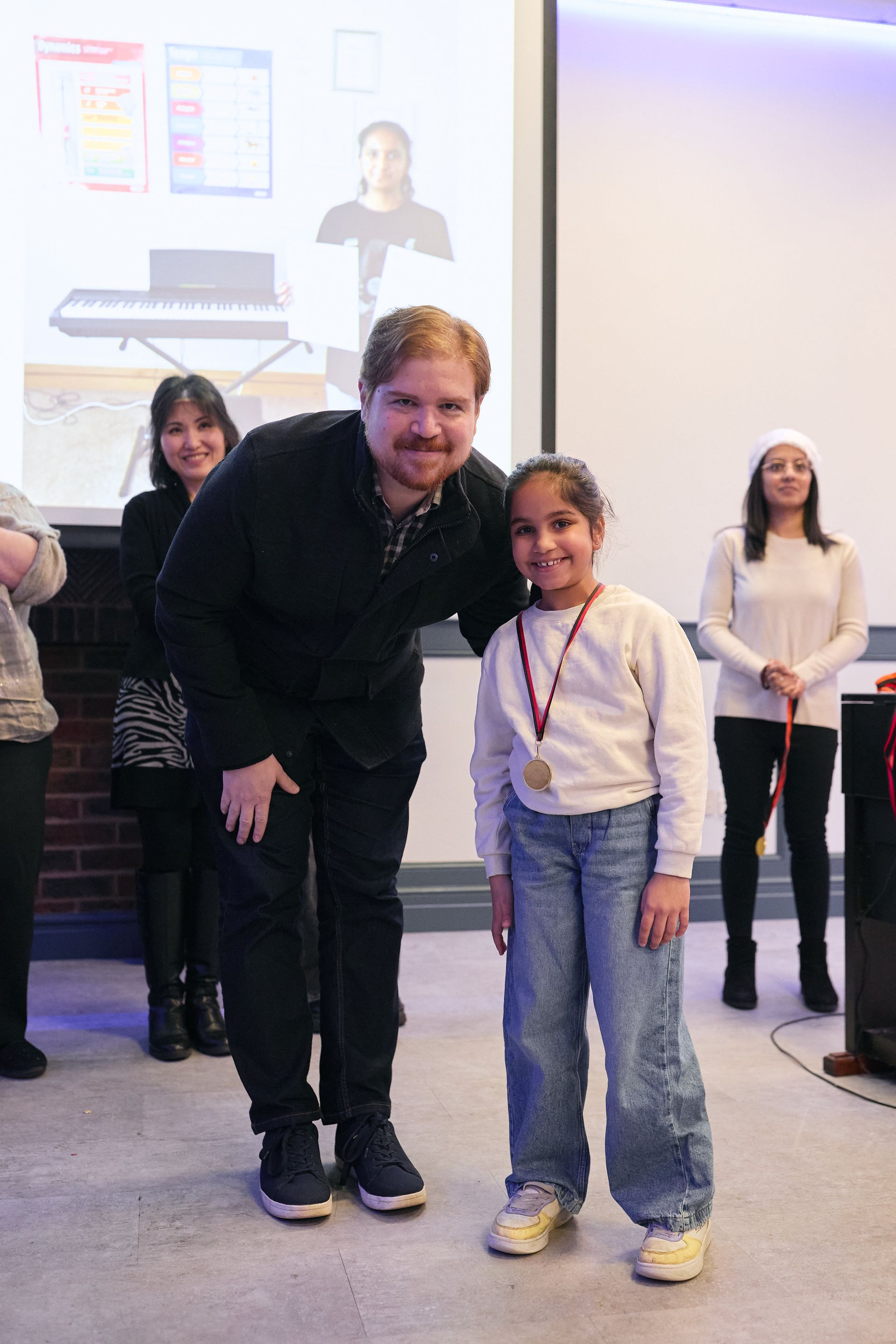Reshmi Patel • March 15, 2021
Online Versus In-Person Piano Lessons
As the UK Lockdown restrictions begin to ease over the course of the next few months, we felt it was appropriate to share some of our learnings to support piano teachers and students who may be making a new transition between online and in-person lessons.
Here are our top tips to finding the balance which works best for you and the resources available:
1) Being open to new experiences
Although we miss face-to-face lessons, as a team we’ve worked incredibly hard to create an engaging online experience for our students. We were willing to continue on our mission in whichever medium possible!
Similar to a lot of education providers, we naturally had a handful of students who were reluctant to try online lessons but they gave it a go anyway and have been able to seen the progress and adaptations we have put into place. For this reason, when anyone asks about if they should TRY online lessons, we always recommend they give it a go.
If there are trial classes or periods, we’d recommend giving these a go whether this is in-person or online.
2) Connection
The relationship between student and teacher plays a large role in the trajectory of a child or adults’ success. It’s important for the children to feel safe and be able to express themselves with their teacher, particularly for those participating in creative arts activities. For this reason, whether it’s online or in-person we recommend asking any questions you have and reflecting on your lesson after you have met your teacher. If they are not the correct fit for you, that’s okay, there are plenty of other teachers to choose from.
3) Communication
It may be useful to look at the different forms of communication, both for online and in-person lessons.
It’s important for both student and teacher to have forms of communication outside of their lessons should they require feedback on their playing or have any questions or concerns.
The most important question to ask if you are having an in-person lesson is if the Covid-19 guidelines will be followed (if these are still applicable when you have your lesson) and how to ensure you can best follow these practices before arriving to your lesson. For online lessons the questions may be, which details are required to login to the lesson and what equipment is required before you join the call.
Here’s a brief checklist of what you will need in preparation for an online Piano Lesson with Key Sounds UK: https://www.keysoundsuk.com/our-best-practices-using-zoom-for-online-piano-lessons
Here at Key Sounds UK it’s always been about communication and building empowering relationships with our students.
We are so fortunate to have such cooperative students and tools available to us. Let’s take advantage of them and help spread the joys of learning and listening to music.
Feel free to take a look around our website or connect with us directly.
To find out more, feel free to get involved in our latest project “The Habits of the Top Performing Piano Players”, fill out our survey: https://bit.ly/2FDs8rf
For your chance to win a Nintendo DS Lite or a £50 Amazon Gift Voucher.


“We’ve been doing lessons for a while… but how do I know if it’s actually working?” This is one of the most common and completely valid questions parents ask themselves, especially if they’re not musical. Progress in piano doesn’t always look or sound obvious in the early stages. Unlike some activities, results aren’t instant and that can feel worrying when you’re investing time, money, and emotional energy into your child’s learning. The reassuring news? Most healthy musical progress happens quietly before it becomes obvious. Here’s what to realistically expect over time and when not to worry. What Progress Often Looks Like around 3-6 Months(if they began as a beginner) At this stage, progress is mostly about settling in. You might notice: Your child feels more comfortable sitting at the piano They recognise lesson routines They’re starting to listen more carefully, even if notes aren’t perfect What’s normal here: Hesitation Needing reminders and support This isn’t slow progress, it's foundation-building. What Progress Often Looks Like at 7-12 Months This is when progress becomes clearer to most parents. You may notice: Greater independence Less hesitation when playing Improved posture and focus Pride in what they can play Not every child is ready for grades at this stage and that’s perfectly fine.Your child is learning how to learn and that skill takes time. Strong foundations now often lead to faster, more confident progress later. If you have any questions please feel free to reach out!

“They’ve had a long day… should we still push through practice?” Many parents feel torn between supporting consistency and respecting their child’s energy levels especially during busy school weeks. The truth is: Tiredness doesn’t mean lack of commitment. It often means your child’s brain needs a different approach. Here’s how to handle it without guilt or pressure. It’s reasonable to adjust expectations when: Your child is overwhelmed with school or clubs They’re emotionally exhausted Concentration is unusually low Short, calm practice is far more valuable than long, frustrated sessions. Sometimes: 5 focused minutes beats 20 stressed ones Listening to a piece counts as engagement Talking about the lesson reinforces learning How Teachers Adapt During Busy Periods Good teachers expect fluctuations in energy. During tiring phases, lessons may focus more on: Confidence and comfort Reinforcing known material Gentle technical reminders Enjoyment and connection to music This doesn’t slow progress, it protects it. How Parents Can Communicate This Proactively One of the most helpful things you can say is: “It’s been a heavy week. Please let us know what’s realistic to focus on.” This allows the teacher to: Adjust expectations Support your child emotionally Keep progress aligned without pressure You’re not letting anyone down you’re advocating. What Matters Most Long-Term Children who feel supported (not pushed) are more likely to: Stick with lessons Build confidence Develop a healthy relationship with learning Music is a long journey - not a sprint. A Gentle Reminder for Parents Rest, flexibility, and understanding are not signs you are supporting them. If you’re unsure how to balance tiredness with consistency, we’re always happy to help you find a rhythm that works for your family. If you have any questions please feel free to reach out!

Many parents tell us the same thing: “I want to support my child’s piano learning but I’m not musical, so I don’t know what to look for.” The truth is, you don’t need to read music or play the piano to be a huge part of your child’s progress. What matters most is how you observe, encourage and communicate, not your musical knowledge. Here are three simple, practical ways to stay involved and confident. 1️. Sit In on Lessons (Even Occasionally) You don’t need to attend every lesson -just sitting in from time to time can make a big difference. When you observe a lesson, you begin to notice: How your child is guided to sit and place their hands How the teacher breaks tasks into small, achievable steps The language and cues your child responds to Sit in for 10-15 minutes once every few weeks. This is to absorb rather than to assess. This helps you support practice at home using the same language the teacher uses. 2. Record a “Before vs After” Video One of the clearest ways to see progress - especially for non-musical parents - is through short videos. How it works: Record your child playing a song or exercise Then record the same song or exercise 5–6 lessons later, or on the day the teacher says it’s “finished” You’re not looking for perfection. Instead, notice small but meaningful changes: Confidence: Do they sit more comfortably and start playing more willingly? Hand position: Do they find their starting position more quickly? Flow: Are there fewer pauses or gaps in the music? Even tiny improvements are signs of progress - especially at this stage of learning Keep the video private. This isn’t for comparison with others - it’s simply a reminder of how far your child has come. 3. Set Simple Checkpoint Goals With the Teacher Progress doesn’t always mean “moving up a level”. For younger learners, it often shows up in skills and habits. Setting small checkpoint goals helps you know what to look out for at home. Examples of helpful checkpoint goals: “Starting the piece without help” “Finding hand position independently” “Playing through without stopping” “Feeling confident playing for someone else” Ask the teacher: “What’s one thing we should notice improving over the next few lessons?” This gives you clarity and keeps expectations realistic. A Reassuring Note for Parents At ages 6–8, piano progress is often gradual and subtle and that’s exactly how it should be. Confidence, comfort at the keyboard, and smoother transitions are just as important as notes and rhythms. By observing, recording small milestones, and staying aligned with the teacher, you’re already playing a vital role in your child’s musical journey even if you’ve never played a note yourself. If you have any questions please feel free to reach out!
